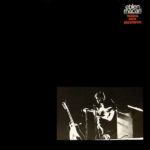
Every time I revisit Eblen Macari’s landmark release, Música Para Planetarios, I find something different and special about it. At times, it’s finding pride that something like this exist where one’s own Mexican culture doesn’t need to be negated/subjugated to create something spectacularly pioneering. Other times, it’s when I sit back and identify cultural cues and traditions inherent in the music, that point to new directions my own culture can still take – and others, elsewhere, can still feel inspired by. Right now, it’s just realizing how thankful I’ve gotten to a point in my life when I can appreciate something like this can exist and all the wonderful players that saw fit to bring about Eblen Macari’s vision of Mexican music that can stretch for some rarified height and damn near reach it.

Eblen Macari was a multi-instrumentalist of Lebanese descent who formed part of the great Arab community that arrived in Mexico after the end of World War II. From a young age Eblen was interested in music and finding his place in society. Music granted him that perfect opportunity to explore all the polyglot pot of influences that made him who he was. The guitar especially so, opened up the world of more overt Ibero-American, Brazilian, and Arabic traditions that helped shape Mexico’s own musical tradition. Somewhere, down the line, he rounded back and realized the power of Mexico’s own fascinating Pre-Columbian music. What does someone moved by all this discovery, plus the music of Egberto Gismonti, Oregon, Ralph Towner, and intrigued by the possibilities of synthesizers and electronic music do?
At first, Eblen tries to play the game and fashions himself a Nueva Trova singer, Un Producto De Los Sesentas is the slight fruit of that attempt. In 1983, Eblen truly goes after his original ideas. Trayectos (recorded as a duo with Juan Valdés) shows him performing in a style trying to find a way into the proto-ambient European-style jazz of the ECM variety. A intricate, delicate work of treated and untreated acoustic guitar, Trayectos showed that Eblen had a capability to roll in his more Latin American-indebted sound with the icy, moody soundscapes favored by European-jazz auteurs.
A year later, Glaciares, showed Eblen experimenting for the first time combining electronics (synths and treated recordings) with a much larger ensemble of guitars, voice, and percussion. Pointillistic in nature, Glaciares would be as close as he’d ever come to dissecting all the bits that would make up the future of his career. Here you hear eons old Arabic-musical tradition strike an intrepid play with largely unexpected New Age avant garde environmentally-influenced sonic experiments more at home on a Steve Roach record than on a Latin label release – no faint praise, considering Eblen beat Steve Roach to the punch a year earlier. Basically, Eblen was creating world music that went beyond a specific culture but drew motion from within his own constitution – it’s touching that void of fourth world music where tradition shapeshifted toward renewed, modified forms. Inspired by the Valley of Mexico, Glaciares, ventured into musical paths few in Mexico traversed, creating music that felt the inspiration of a rarefied environment and painted it back with equal, impressionistic fervor.
Música Para Planetarios is as much a statement piece for Eblen as it is for Mexican music in general. Joined by the likes of José Luis Almeida, ethno-rock band Tribu, Arturo Meza, Olga Martinez and his sister (the great soprano singer Jeanette Macari), Música Para Planetarios posits that Eblen wasn’t out on a ledge by himself only. There was this whole other group of people that were tapping into the unknown and untrodden path of world music, where there wasn’t a word or style to slot them in. Mexico had this vibrant ambient, experimental, and folkloric underground where the words Latin, new age, fusion, and world music, served to extinguish the unique musical contributions they were trying to make and ideas they attempted to move forward.
Fleshing out Eblen’s original compositions that he performed weekly at a planetarium in Mexico City, Música Para Planetarios sounds as spectral as it does in projecting terrestrial and spiritual movement. Conceived for a city where actually seeing stars at night is (for most) a faint dream, Música Para Planetarios was a suite of music where ambient starscapes, give way to otherworldly neo-folkloric sounds, only to be brought together, in ways that remind me of the environmental music being created way out in the Pacific. It’s thirty three minutes of deeply interior, external music that unfurls as a gorgeous mixture of synthetic and organic matter – a cosmic jungle of inner space and deep earth. Creating an atmosphere you can’t from purely staring into the star-lit night, Música Para Planetarios resolves to remind you of the place it’s coming from, in exactly the direction (on this great earth) that it holds its own gaze up, at our shared heavens above. It’s a slice of the world I’ve shared bits of before, and one I can’t wait to come back and share more of soon.
